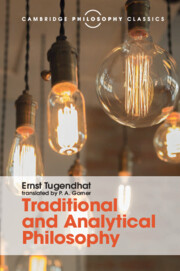Book contents
- Frontmatter
- Dedication
- Contents
- Preface
- Preface
- Translator's preface
- Part I Introduction: confrontation of analytical philosophy with traditional conceptions of philosophy
- Part II A first step: analysis of the predicative sentence
- 8 Preliminary reflections on method and preview of the course of the investigation
- 9 Husserl's theory of meaning
- 10 Collapse of the traditional theory of meaning
- 11 Predicates: the first step in the development of an analytical conception of the meaning of sentences. The dispute between nominalists and conceptualists
- 12 The basic principle of analytical philosophy. The dispute continued. Predicates and quasi-predicates
- 13 The meaning of an expression and the circumstances of its use. Dispute with a behaviouristic conception
- 14 The employment-rule of an assertoric sentence. Argument with Grice and Searle
- 15 Positive account of the employment-rule of assertoric sentences in terms of the truth-relation
- 16 Supplements
- 17 ‘And’ and ‘or’
- 18 General sentences. Resumption of the problem of predicates
- 19 The mode of employment of predicates. Transition to singular terms
- 20 What is it for a sign to stand for an object? The traditional account
- 21 The function of singular terms
- 22 Russell and Strawson
- 23 What is ‘identification’?
- 24 Specification and identification. Specification and truth
- 25 Spatio-temporal identification and the constitution of the object-relation
- 26 Supplements
- 27 Results
- 28 The next steps
- Bibliography
- Index of names
- Index of subjects
16 - Supplements
from Part II - A first step: analysis of the predicative sentence
Published online by Cambridge University Press: 05 August 2016
- Frontmatter
- Dedication
- Contents
- Preface
- Preface
- Translator's preface
- Part I Introduction: confrontation of analytical philosophy with traditional conceptions of philosophy
- Part II A first step: analysis of the predicative sentence
- 8 Preliminary reflections on method and preview of the course of the investigation
- 9 Husserl's theory of meaning
- 10 Collapse of the traditional theory of meaning
- 11 Predicates: the first step in the development of an analytical conception of the meaning of sentences. The dispute between nominalists and conceptualists
- 12 The basic principle of analytical philosophy. The dispute continued. Predicates and quasi-predicates
- 13 The meaning of an expression and the circumstances of its use. Dispute with a behaviouristic conception
- 14 The employment-rule of an assertoric sentence. Argument with Grice and Searle
- 15 Positive account of the employment-rule of assertoric sentences in terms of the truth-relation
- 16 Supplements
- 17 ‘And’ and ‘or’
- 18 General sentences. Resumption of the problem of predicates
- 19 The mode of employment of predicates. Transition to singular terms
- 20 What is it for a sign to stand for an object? The traditional account
- 21 The function of singular terms
- 22 Russell and Strawson
- 23 What is ‘identification’?
- 24 Specification and identification. Specification and truth
- 25 Spatio-temporal identification and the constitution of the object-relation
- 26 Supplements
- 27 Results
- 28 The next steps
- Bibliography
- Index of names
- Index of subjects
Summary
The multiplicity of semantic theories I have touched on in the last two lectures in the process of trying to achieve what seems to me to be a tenable preliminary concept of the meaning of an assertoric sentence may have left behind a certain confusion. So before taking up the problem to which the line of thought of the last lecture led it seems to me to be necessary to insert a lecture devoted to surveying what has been achieved. This will enable me to say something about the connections between the various positions and to add a supplement that will be important for what will follow.
The various theses about the meaning of assertoric sentences (a.s.) are as follows.
(1) One understands an a.s. if one knows for which state of affairs it stands.
(2) One understands an a.s. if one knows in which circumstances it is to be used.
(3) One understands an a.s. if one knows what its truth-conditions are.
(4) One understands an a.s. if one knows what its verification-rules are.
(5) One understands an a.s. if one knows what belief the person who uses it communicates to a hearer.
(6) One understands an a.s. if one knows which assertion-act a speaker can perform with it (illocutionary act theory).
(7) One understands an a.s. if one knows the verification-game whose opening-move is performed with it.
The most striking thing both about the line of thought as it has turned out and about virtually all important modern theories is the central position which the concept of truth suddenly acquires. You could say: that statements can be true or false is something one has always known. Before Frege, however, no one had hit upon the idea of defining the meaning – the sense – of a sentence by means of its truth-conditions. The ‘reality-relation’ of statements was also understood as truth in the philosophical tradition, but this relation always remained pre-defined as a relation to things (res), to beings. It is only when one is primarily orientated towards sentences rather than towards names that it seems natural to start with the possible truth of a sentence and by reference to this understand even its meaning.
- Type
- Chapter
- Information
- Traditional and Analytical PhilosophyLectures on the Philosophy of Language, pp. 216 - 235Publisher: Cambridge University PressPrint publication year: 2016



